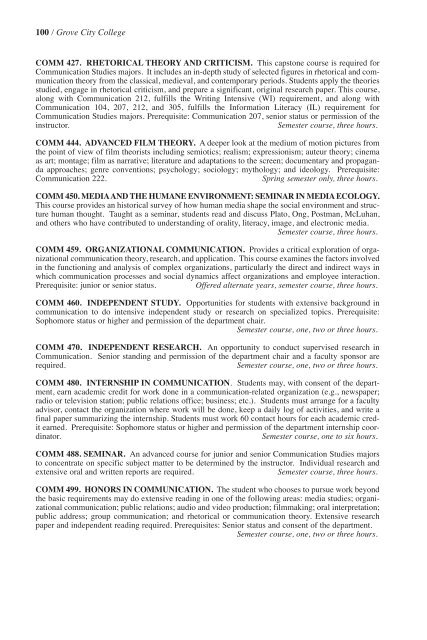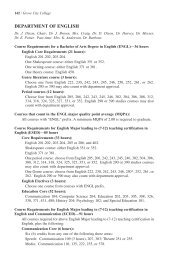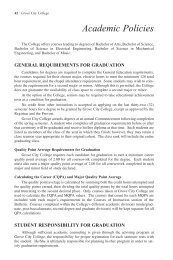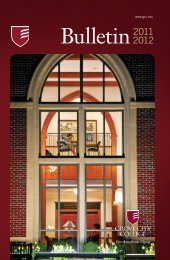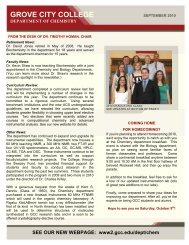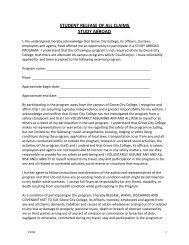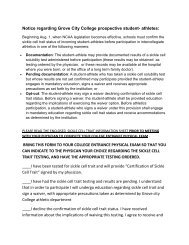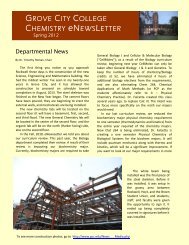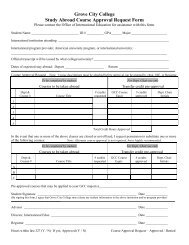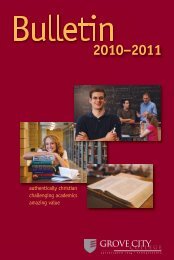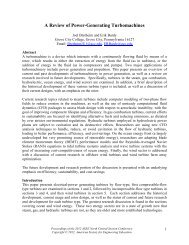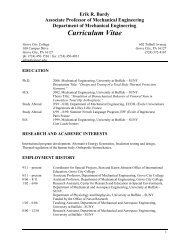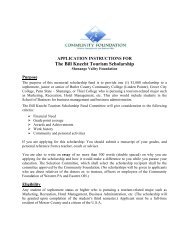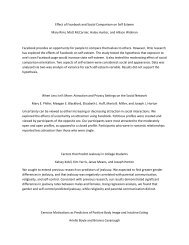2009–2010 - Grove City College
2009–2010 - Grove City College
2009–2010 - Grove City College
Create successful ePaper yourself
Turn your PDF publications into a flip-book with our unique Google optimized e-Paper software.
100 / <strong>Grove</strong> <strong>City</strong> <strong>College</strong><br />
COMM 427. RHETORICAL THEORY AND CRITICISM. This capstone course is required for<br />
Communication Studies majors. It includes an in-depth study of selected figures in rhetorical and communication<br />
theory from the classical, medieval, and contemporary periods. Students apply the theories<br />
studied, engage in rhetorical criticism, and prepare a significant, original research paper. This course,<br />
along with Communication 212, fulfills the Writing Intensive (WI) requirement, and along with<br />
Communication 104, 207, 212, and 305, fulfills the Information Literacy (IL) requirement for<br />
Communication Studies majors. Prerequisite: Communication 207, senior status or permission of the<br />
instructor. Semester course, three hours.<br />
COMM 444. ADVANCED FILM THEORY. A deeper look at the medium of motion pictures from<br />
the point of view of film theorists including semiotics; realism; expressionism; auteur theory; cinema<br />
as art; montage; film as narrative; literature and adaptations to the screen; documentary and propaganda<br />
approaches; genre conventions; psychology; sociology; mythology; and ideology. Prerequisite:<br />
Communication 222. Spring semester only, three hours.<br />
COMM 450. MEDIA AND THE HUMANE ENVIRONMENT: SEMINAR IN MEDIA ECOLOGY.<br />
This course provides an historical survey of how human media shape the social environment and structure<br />
human thought. Taught as a seminar, students read and discuss Plato, Ong, Postman, McLuhan,<br />
and others who have contributed to understanding of orality, literacy, image, and electronic media.<br />
Semester course, three hours.<br />
COMM 459. ORGANIZATIONAL COMMUNICATION. Provides a critical exploration of organizational<br />
communication theory, research, and application. This course examines the factors involved<br />
in the functioning and analysis of complex organizations, particularly the direct and indirect ways in<br />
which communication processes and social dynamics affect organizations and employee interaction.<br />
Prerequisite: junior or senior status. Offered alternate years, semester course, three hours.<br />
COMM 460. INDEPENDENT STUDY. Opportunities for students with extensive background in<br />
communication to do intensive independent study or research on specialized topics. Prerequisite:<br />
Sophomore status or higher and permission of the department chair.<br />
Semester course, one, two or three hours.<br />
COMM 470. INDEPENDENT RESEARCH. An opportunity to conduct supervised research in<br />
Communication. Senior standing and permission of the department chair and a faculty sponsor are<br />
required. Semester course, one, two or three hours.<br />
COMM 480. INTERNSHIP IN COMMUNICATION. Students may, with consent of the department,<br />
earn academic credit for work done in a communication-related organization (e.g., newspaper;<br />
radio or television station; public relations office; business; etc.). Students must arrange for a faculty<br />
advisor, contact the organization where work will be done, keep a daily log of activities, and write a<br />
final paper summarizing the internship. Students must work 60 contact hours for each academic credit<br />
earned. Prerequisite: Sophomore status or higher and permission of the department internship coordinator.<br />
Semester course, one to six hours.<br />
COMM 488. SEMINAR. An advanced course for junior and senior Communication Studies majors<br />
to concentrate on specific subject matter to be determined by the instructor. Individual research and<br />
extensive oral and written reports are required. Semester course, three hours.<br />
COMM 499. HONORS IN COMMUNICATION. The student who chooses to pursue work beyond<br />
the basic requirements may do extensive reading in one of the following areas: media studies; organizational<br />
communication; public relations; audio and video production; filmmaking; oral interpretation;<br />
public address; group communication; and rhetorical or communication theory. Extensive research<br />
paper and independent reading required. Prerequisites: Senior status and consent of the department.<br />
Semester course, one, two or three hours.


